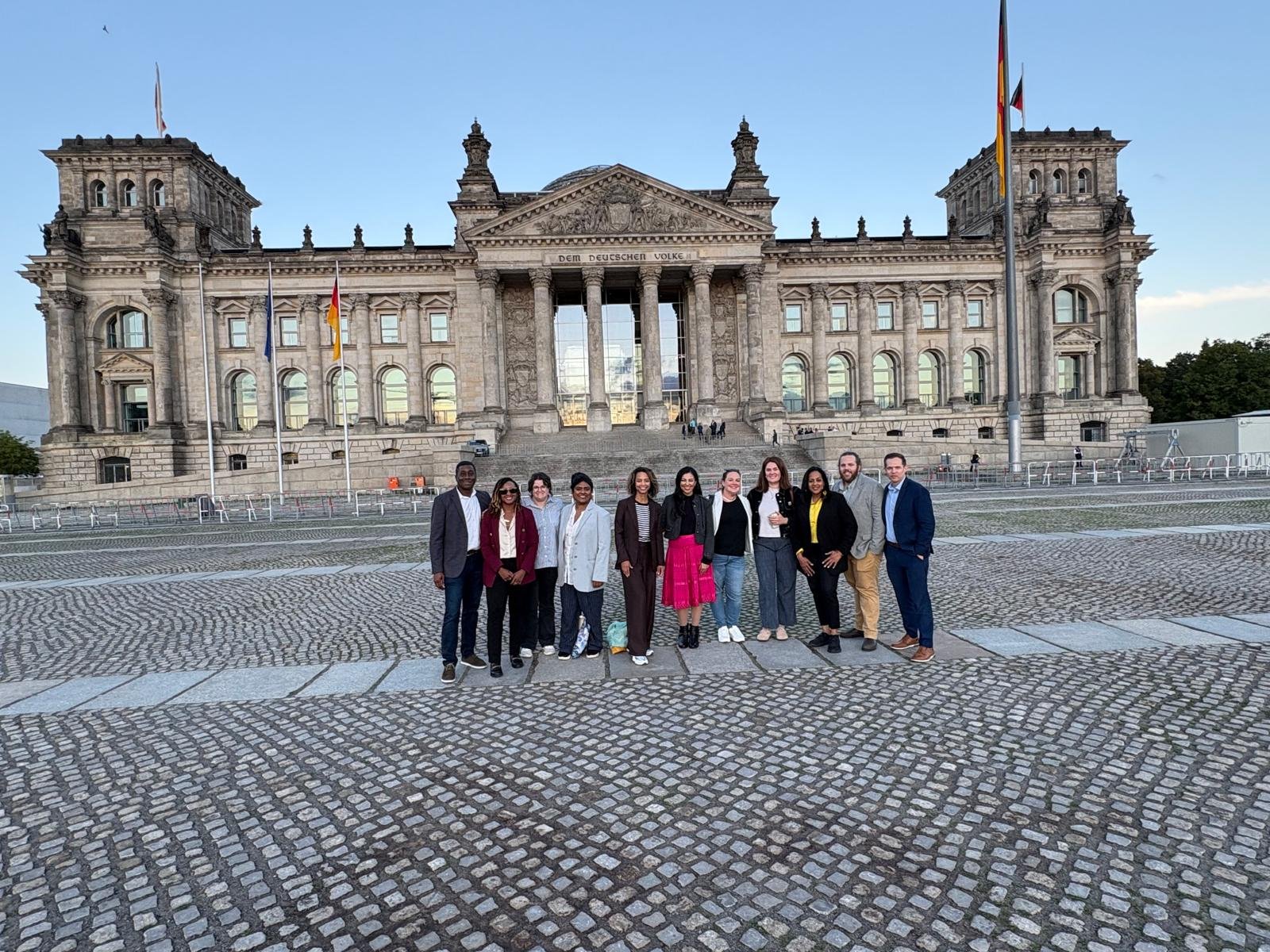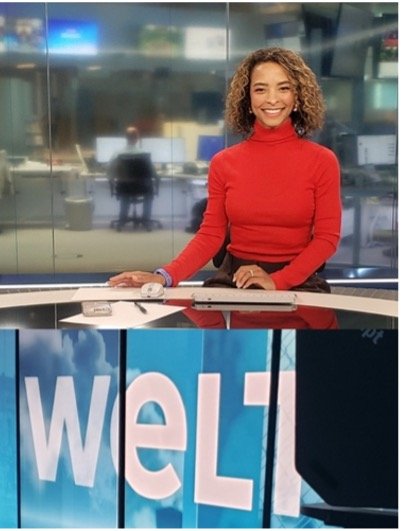
Constance Jones, NBC 6, Miami, Florida
It has truly been a whirlwind and an incredible honor to be part of this year’s RIAS program cohort. RIAS was an unforgettable, life-changing opportunity that broadened my perspective in so many ways. The first part of our journey included meetings with NATO officials, the European Commission, the EU Press Office, and the Bruegel Think Tank. We also had the chance to visit several radio and television broadcasting stations across Germany—a closer look at how media is shaping national conversations. One of the highlights of my fellowship included the time I spent with the team at WELT Nachrichtensender. The newsroom team was incredibly engaging—we discussed the role of AI in journalism and how it’s challenging traditional ways of presenting news to the public. Beyond the newsroom, we also took a deep dive into history. Hearing directly from Peter Keup—a historian and a former political prisoner in an East German Stasi prison—was very emotional. Hearing his story made history feel real for me. Every journalist in this fellowship was thoughtful, brilliant, and inspiring. We are living in extraordinary times, and this program reminded me of just how vital our work truly is. I am deeply grateful for this experience.
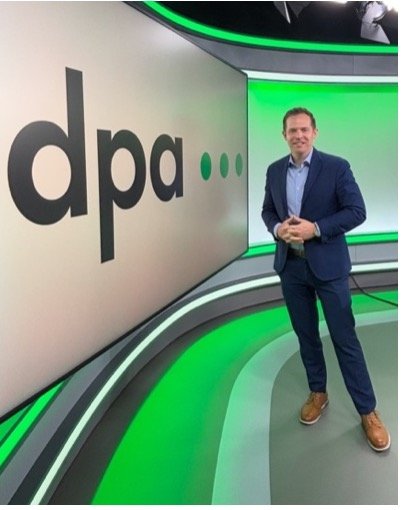
Reuben Jones, Spectrum News, Washington, D.C.
Being a fellow with RIAS was truly an amazing experience. Much of our focus in the U.S. media is often insular so learning more about Germany and international issues from journalists and newsmakers was very informative and beneficial. I came away with a notebook full of information and notes I will be using in my reporting as well as passing along to colleagues in my newsroom. The job of a journalist is often non-stop with little time to reflect. Having two weeks to step back and just learn and observe will make me a stronger and more informed journalist. Of specific note I really enjoyed my station day visits at DW News where I was able to ask lots of questions and come away with key takeaways that I will implement in my job. I was very interested to learn of how the outlet is undergoing changes to adapt to social media and I found the visit to DW’s parliament bureau in Berlin beneficial because it operates in a similar manner to the bureau I work at in Washington DC. I also found the visits at the EU and NATO very informative and learning from so many Germans about everything from the Berlin Wall to the country’s public media system to parliament was truly memorable. I can’t recommend this program enough for journalists who want to expand their international knowledge and help produce more contextual reporting in a world of chaotic news cycles. It was also just a great group of people to be involved with for two weeks.
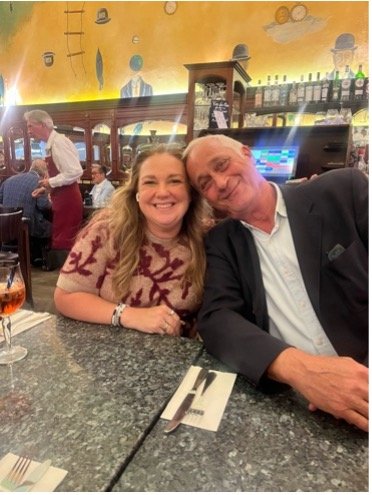
Tara Puckey, RTDNA, Indianapolis, Indiana
Participating in the RIAS Berlin Commission program was eye-opening and deeply inspiring. The experience created a space to build a shared understanding not only of journalism across continents, but also of the common humanity in a time where that feels challenging. In conversations with colleagues from diverse backgrounds, I was reminded that while our media landscapes may differ in structure, funding, you name it, the challenges we face as journalists are strikingly similar. At a time when journalism is under intense pressure, the program offered an invaluable reminder that we are more alike than different. The exchanges underscored how journalists everywhere are committed to the same core principles: accuracy, fairness and a dedication to serving the public. Through thoughtful newsroom conversations, I gained fresh insights into how others approach these challenges and left with a renewed sense of purpose in my own work. What made the experience even more meaningful were the personal connections. The program created lasting bonds with colleagues. These relationships serve as a powerful source of encouragement and inspiration, reminding me that journalism is not a solitary pursuit but a collective effort. And, most important, we had so much fun. Ultimately, the RIAS program reinforced that in these challenging times, global solidarity among journalists is not just beneficial, it's essential. The lessons and friendships from this program will continue to shape my outlook and work for years to come.
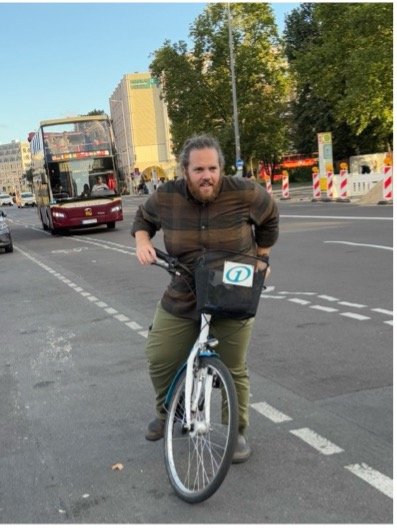
Matt Martin, KUOW, Seattle, Washington
The RIAS Fellowship was both a career highlight and a cultural immersion. Rather than simply being a tourist, the program encouraged me to approach Germany as a curious traveler. Through conversations with government officials, think tanks, and journalists, I gained a deeper understanding of the issues shaping Germany and the transatlantic relationship. As someone working in public radio in the U.S., I was especially struck by how well public broadcasting is supported in Germany, particularly compared to the loss of government funding back home. Still, it was eye-opening to hear that German outlets face many of the same pressures and political debates over funding. Despite these challenges, I was encouraged by the optimism and determination of people committed to sustaining trusted journalism. The most meaningful takeaway from my time in Germany was a renewed sense of energy for my own work. It was inspiring to meet journalists, both German and the other Americans on the program, confronting similar struggles yet remaining steadfast in their commitment to the fourth estate
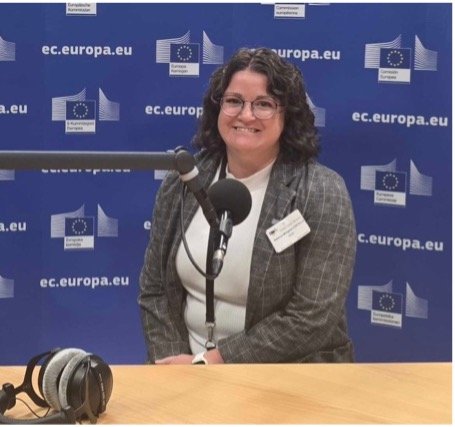
Becca Costello, WVXU, Cincinnati, Ohio
Participating in the RIAS fellowship surpassed all my expectations. Our days in Brussels, Cologne, Berlin, and Leipzig were packed with visits that broadened my understanding of the world and bolstered my commitment to journalism. To do it all with a group of incredible reporters and editors from across the United States was the cherry on top. Learning about the funding model for public broadcasting in Germany was especially interesting so soon after the U.S. public broadcasting recission vote. Highlights of the trip include visiting the Bundespressekonferenz, a screening of a new documentary from RIAS alum about East Germany’s Stasi surveillance state, and countless conversations that inspired and encouraged me. I returned home with unforgettable memories, a network of new friends from around the world, and a tattoo – truly an lifechanging experience.
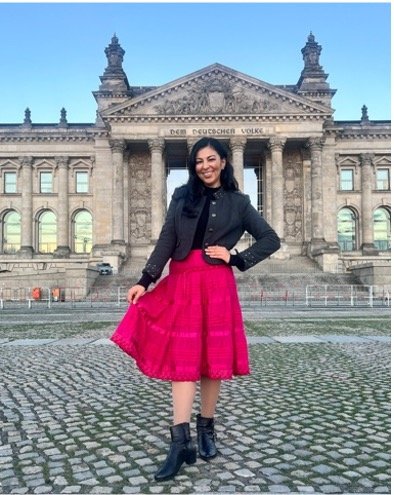
Astrid Mendez, KRGV-Noticias RGV, Weslaco, Texas
The RIAS Berlin Commission Fellowship was a dream of mine for many years and I’m very grateful I finally was able to experience this fantastic, empowering and life-changing program, especially at a time when transatlantic relations, journalism, trade and politics are undergoing a significant transformation, both in the United States and Germany. Our multiple meetings included think tanks, policy makers and the German Marshall Fund, as well as visits to NATO, the European Commission and several media outlets. Seeing how much respect and support their public media receives was a refreshing discovery and a reminder of the importance of free press in our times. My station assignment to ZDF was a fascinating learning experience among very talented and dedicated journalists, with proven results on air. Experiences like this on with fellow journalists definitely enriches our professional experience. Also, having a great cohort made the whole journey one to deeply remember and cherish. While we all come from different backgrounds, our passion for journalism, our desire to strengthen our knowledge and create strong bonds has united us for the rest of our lives. While there are many unanswered questions about the future of our profession, learning and witnessing the consequences that a divided community brings for many generations after, like it has in Germany, has been a stark reminder of what we could face in the future, but also that our commitment to journalism is now more important than ever. As a bilingual TV journalist, I realize the unique role we bring to our diverse community and why is important to remember our history. For this and many more reasons, I couldn’t be more appreciative for everyone that has made possible and has provided this worldly and fulfilling fellowship. Thank you!!!

Jonathan Lowe, WSOC, Charlotte, North Carolina
Amidst political discourse and, tragically, violence, being a journalist in the United States at this time in history probably doesn’t present the best fit for someone who is unsure about the industry. Ensuring access to a free and fair press will take strong minds asking tough questions. That is what my participation in the RIAS Journalist Program taught me. The US, the EU, and, specifically, Germany, have been intertwined in a close, personal bond since before the World War 2 era. My cohort, that also formed a close, personal bond, took a deep dive into that relationship; politically, historically, and journalistically. And why continuing to cultivate those historic transatlantic relationships is so very vital to the progress of both sides of the pond. It started with our meetings at the various media organizations that make up Germany’s public broadcasting system, as well a privately owned operation. It was fascinating to learn how the U.S. helped form a free and fair press after WW2, as well as the similarities and differences between current-day German and American media. But my group’s trip also included some stark and deeply emotional “behind the scenes” views of history that will stick with me forever. There was the tour of the mansion where the Holocaust was concocted by Adolf Hitler’s underlings. Or the walk-thru of the East Side Gallery Memorial with Kani Alavi, came up with the idea of letting artists memorialize that period era with their own creation. We also met and saw a private screening about Peter Keup. He spent almost a year in prison after trying to escape East Berlin. He learned later in life that his late brother is the one who turned him in to the secret police. Then, there were my “station days” at ARD 1, which produces and airs Germany’s #1 nightly newscast called “Tagesschau.” Their operation was well-run, sleek, and professional. My hosts Melissa, Michail, and Michael really went out of their way to make me feel welcome and taken care of, while also being interested in how I do my job. Being part of the program was an epic opportunity of a lifetime, and I am so proud to now be a “RIAS alum.”
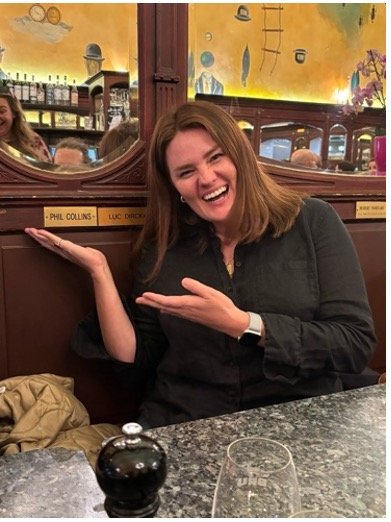
Ana Campbell, The Texas Newsroom, Austin, Texas
I am profoundly grateful for the two weeks I just spend in Europe with my RIAS cohort. The program's organizers gave us excellent insight into history and current issues facing Germany and the rest of Europe through the various tours and meetings we took with lawmakers, think tanks, journalists and victims of some of the atrocities committed in the aftermath of World War II. We had deep conversations with leading figures in German media and politics -- and each other. The program felt especially relevant given all the change happening in global politics. I've never experienced something as rewarding both professionally and personally as RIAS. If you're curious about the world and your place in it, I'd seriously recommend applying!
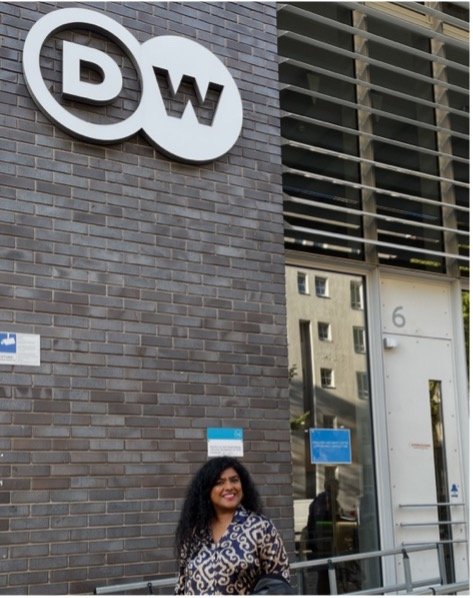
Fenly Foxen, CNN, Atlanta, Georgia
Traveling across Europe with my RIAS cohort was an experience I’ll treasure forever. Our journey began in Brussels, Belgium, where we immersed ourselves in the city’s international flair. We had the incredible opportunity to attend meetings at the European Commission, NATO Headquarters, and prominent think tank—offering us invaluable insights into international affairs and diplomacy.Next, we made our way to Cologne, Germany, a city gracing the banks of the Rhine. The awe-inspiring Cologne Cathedral (Dom) stood as a majestic reminder of history and resilience. In Cologne, we deepened our understanding of Germany’s media landscape through visits to WDR and Domradio—an eye-opening look into the role of journalism in shaping public discourse. Our next destination was Germany’s wild and vibrant capital—Berlin. This leg of the journey was especially powerful. We stood at the remnants of the Berlin Wall, and emotions ran high during our tour of a former Stasi prison led by Peter Keup, a historian and former political prisoner. His deeply personal story of oppression and survival left a lasting impression. We also spent meaningful time in Leipzig, where we visited Robert Capa museum, a synagogue, and public broadcaster MDR. One of the most haunting and educational stops was at the House of the Wannsee Conference, where we confronted the chilling details of the 1942 meeting where Nazi leaders planned the genocide of European Jews. That moment changed me. A major highlight was our visit to news channel Welt, where I had the chance to witness the inner workings of a leading newsroom—an experience that was both inspiring and educational. This journey filled me with immense gratitude. A heartfelt thank you to Christoph Jumpelt, Christina Reif, and Pam Ortega of RIAS for making this unforgettable experience possible. To the incredible U.S. team I traveled with, you quickly became family. I’ll always cherish the memories, the lessons, and the countless laughs we shared along the way. Danke schön, Germany! Forever grateful.
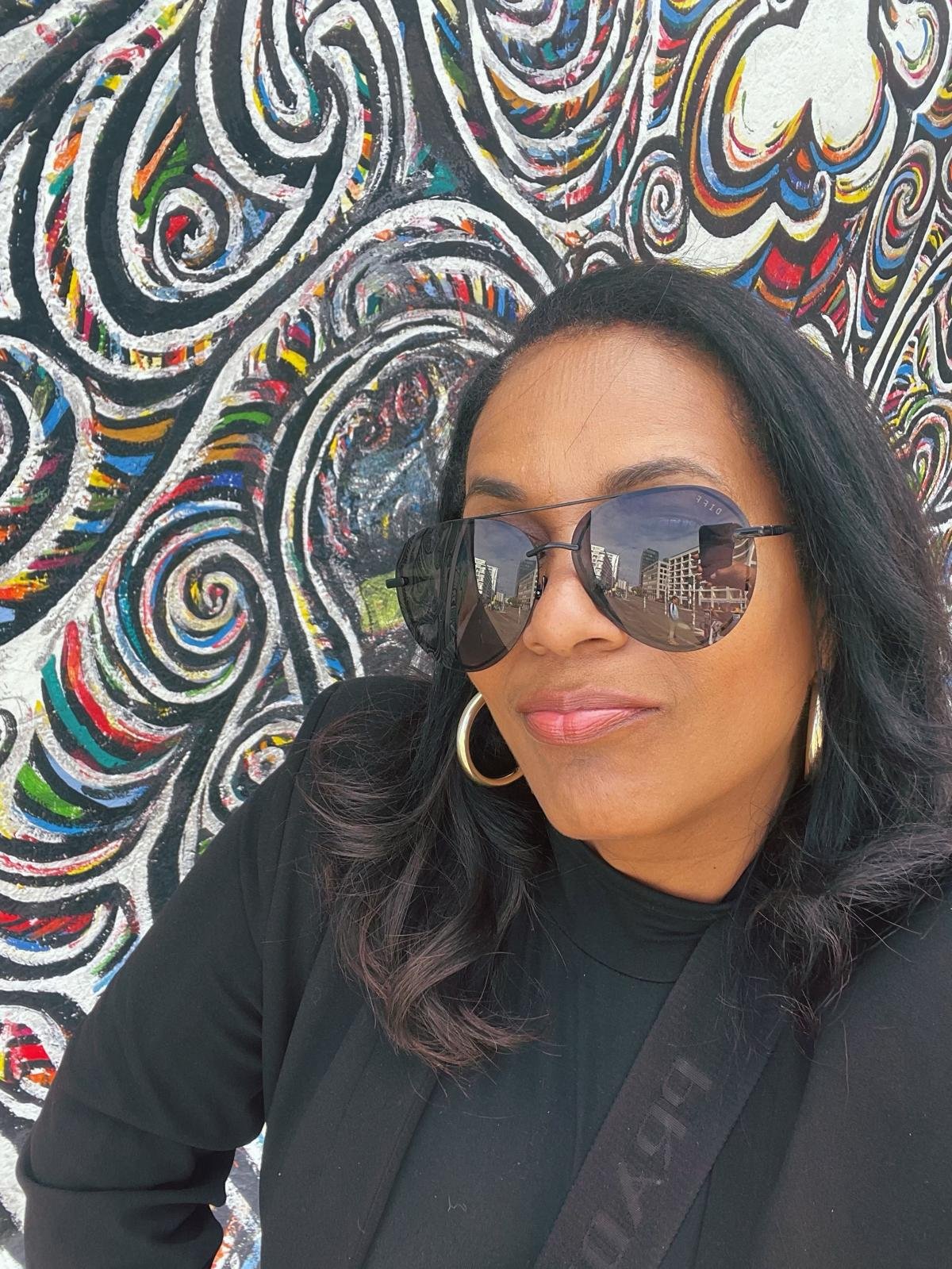
Dionne Anglin, KDFW-TV, Dallas-Fort Worth, Texas
The RIAS Berlin journalists exchange program has, for me, provided a deeply unique learning experience surrounding many German-American and U.S.-European issues. The two-week long journey not only connected us directly with policymakers, experts, and fellow journalists, but it broadened my knowledge and understanding of Germany’s emotional past, particularly, during tours of the East Side Art Gallery of the Berlin Wall, and a former Stasi prison in East Berlin with a former political prisoner as our guide. Additionally, an especially valuable aspect has been the incredible bonds formed among those in our traveling group as well as a few transatlantic connections made with German journalists I’m looking forward to maintaining! So! In my very brief synopsis of this incredible, whirlwind opportunity- I am returning home to my family, and to my career a better-informed, greatly impassioned and mightily inspired American journalist who values, now more than ever, what it means to have a country’s commitment to the principles and institution of journalism which are the makings of a free press.
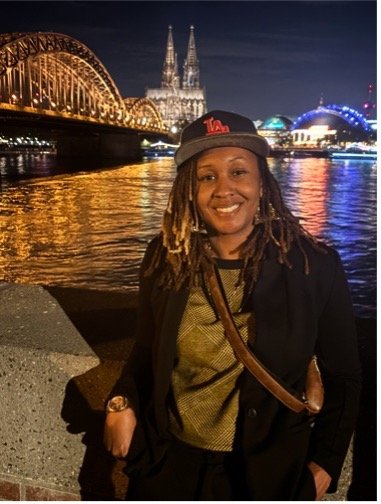
Marlissa Collier, The Dallas Nomad, Dallas, Texas
Four cities. Five hotel rooms. Fourteen days. That was the math of the RIAS Berlin Commission fellowship in Belgium and Germany, a whirlwind that was as exhaustingly disorienting as it was exhilarating. Jet lag blurred into long days of meetings, and nights were punctuated by the kind of half-awake confusion where I’d bolt upright at 3 a.m. and have no idea which hotel room I was in or which way to stumble toward the bathroom on this particular night. And yet, between the fatigue and frantic pace, something remarkable happened. The eleven of us—journalists plucked from across the U.S.—found ourselves in the middle of seismic conversations about the future of democracy, the state of journalism, and the shifting alliances of a world that feels more fragile than ever. In Brussels, at NATO headquarters and the European Commission, officials spoke candidly about the “brave new world” the current U.S. president has created with Europe. Trust, they said, is no longer assumed—it must be constantly recalibrated. Security, energy, and migration policy all feel more tenuous, with allies wondering just how durable America’s commitments really are. Later, think tank conversations in Berlin underscored the same point: the postwar order we take for granted is far more precarious than it looks. Meanwhile, in Cologne, Berlin, and Leipzig, we traced the contours of a journalism industry in flux. Public broadcasters in Germany remain robust thanks to strong public funding, a model that feels almost utopian compared to the fragile economics of U.S. media. But even that system is under threat. The far-right AfD party has made it clear they’d like to gut public funding—eerily reminiscent of how MAGA-aligned conservatives in the U.S. have attacked our own public institutions. At the same time, traditional outlets are leaning into personality-driven storytelling, experimenting with models where the line between journalist and influencer blurs. As the co-founder and publisher of The Dallas Nomad, I recognized my own path in this shift—working to democratize the news by amplifying the voices of the people themselves. Still, all of this unfolded against a backdrop of breaking news at home that rattled our group in real time. It felt as though we had unknowingly been holding the United States together—and once we crossed the Atlantic, the country lost the last shred of good sense we’d left behind. Early in the trip, a school shooting dominated the headlines. German journalists we met confided their fears of losing visas. And then, in Cologne, during an alumni dinner, every phone in the room buzzed at once: Charlie Kirk had been murdered. The mood shifted instantly. Over dessert, the realization settled in—we’d be returning to an America far different from the one we’d departed. Through it all, our cohort became its own tight-knit newsroom. Ten broadcast and public radio professionals and me—the newsfluencer. We got very good at reading one another. When I caught the cold making its way through the group and went quiet, my colleagues carried me through long meetings. When I felt better, I stepped up to lead foreign policy discussions with NATO or policy think tanks. Intellect, humor, empathy, and yes, occasional mood swings (jet lag is undefeated) defined our little traveling newsroom. But there were lighter moments, too. Like our stop at the U.S. Embassy in Berlin. There was no urgent reason to go—it just felt like visiting the aunt who lives in town. If you don’t swing by, she’ll call your mom and tell on you. So we stopped in, checked on the family, and moved on. Personally, I also loved dropping into the Berlin office of the German Marshall Fund. As a former Marshall Memorial Fellow, it was a full-circle moment—a chance to reconnect with old friends and see how my past work in transatlantic policy dovetailed with this present experience. And of course, the culture. The castles, the dungeons, the endless glasses of wine. Meals that lingered, nights that stretched. Public transit so efficient it put American cities to shame. Step counts that rivaled marathons. By the end, our legs carried the story of the trip as much as our notebooks did. Looking back, the RIAS experience was a study in contrasts—policy and nightlife, exhaustion and exhilaration, democracy’s fragility set against moments of sheer joy. It reminded me that journalism is both global and human, that even in moments of disorientation and fatigue, we can hold each other up, and that sometimes, halfway around the world, you glimpse more clearly the weight of the stories waiting back home.
